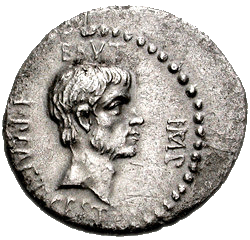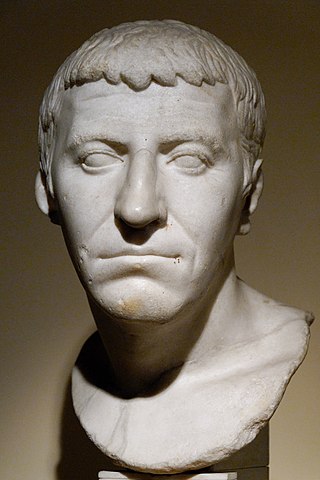Related Research Articles

Marcus Antonius, commonly known in English as Mark Antony, was a Roman politician and general who played a critical role in the transformation of the Roman Republic from a constitutional republic into the autocratic Roman Empire.

Plutarch was a Greek Middle Platonist philosopher, historian, biographer, essayist, and priest at the Temple of Apollo in Delphi. He is known primarily for his Parallel Lives, a series of biographies of illustrious Greeks and Romans, and Moralia, a collection of essays and speeches. Upon becoming a Roman citizen, he was possibly named Lucius Mestrius Plutarchus.

Marcus Junius Brutus was a Roman politician, orator, and the most famous of the assassins of Julius Caesar. After being adopted by a relative, he used the name Quintus Servilius Caepio Brutus, which was retained as his legal name. He is often referred to simply as Brutus.

Alexander Helios was a Ptolemaic prince and son of Pharaoh Cleopatra VII of the Ptolemaic dynasty and Roman triumvir Mark Antony. Alexander's fraternal twin sister was Cleopatra Selene II. Cleopatra named her son after Alexander the Great. His second name in Ancient Greek means "Sun"; this was the counterpart of his twin sister's second name Selene (Σελήνη), meaning "Moon".
Ptolemy Philadelphus was a Ptolemaic prince and was the youngest and fourth child of Greek Ptolemaic Queen Cleopatra VII of Egypt, and her third with Roman Triumvir Mark Antony.

Gaius Cassius Longinus was a Roman senator and general best known as a leading instigator of the plot to assassinate Julius Caesar on 15 March 44 BC. He was the brother-in-law of Brutus, another leader of the conspiracy. He commanded troops with Brutus during the Battle of Philippi against the combined forces of Mark Antony and Octavian, Caesar's former supporters, and committed suicide after being defeated by Mark Antony.
Julia was the mother of the triumvir general Mark Antony.
Marcus Antonius was a Roman politician of the Antonius family and one of the most distinguished Roman orators of his time. He was also the grandfather of the famous general and triumvir, Mark Antony.

The Parallel Lives is a series of 48 biographies of famous men written by the Greco-Roman philosopher, historian, and Apollonian priest Plutarch, probably at the beginning of the second century. It is also known as Plutarch's Lives ; Parallels ; the Comparative Lives ; the Lives of Illustrious Men ; and the Lives of the Noble Greeks and Romans. The lives are arranged in pairs to illuminate their common moral virtues or failings. The surviving Parallel Lives comprises 23 pairs of biographies, each pair consisting of one Greek and one Roman of similar destiny, such as Alexander the Great and Julius Caesar, or Demosthenes and Cicero. It is a work of considerable importance, not only as a source of information about the individuals described, but also about the times in which they lived.

Artavasdes II, also known as Artavazd II, was king of Armenia from 55 BC to 34 BC. A member of the Artaxiad dynasty, he was the son and successor of Tigranes the Great, who ascended the throne of a still powerful and independent state. His mother was Cleopatra of Pontus, thus making his maternal grandfather the prominent King of Pontus Mithridates VI Eupator. Like his father, Artavasdes continued using the title of King of Kings, as seen from his coins.
Publius Ventidius was a Roman general and one of Julius Caesar's protégés. He won key victories against the Parthians which resulted in the deaths of key leaders – victories which redeemed the losses of Crassus and paved the way for Antony's incursions. According to Plutarch in his "Life of Antony", the three military victories of Ventidius over the Parthians singularly resulted in the only award to a Roman general of the triumphal ceremony for victory over Parthians.

Timon of Athens was a citizen of Athens whose reputation for misanthropy grew to legendary status. According to the historian Plutarch, Timon lived during the era of the Peloponnesian War.
"The God Abandons Antony" can also be translated as "The God Forsakes Antony" is a poem by Constantine P. Cavafy, published in 1911.
Charmion, alternatively Charmian, was a trusted servant and advisor to Cleopatra VII of Egypt. Plutarch, in his Parallel Lives biography of Mark Antony, writes that Charmion managed the principal affairs of Cleopatra's government; therefore, she held an important position in Cleopatra's trusted circle.

Julius Caesar was assassinated by a group of senators on the Ides of March of 44 BC during a meeting of the Senate at the Curia of Pompey of the Theatre of Pompey in Rome where the senators stabbed Caesar 23 times. They claimed to be acting over fears that Caesar's unprecedented concentration of power during his dictatorship was undermining the Roman Republic. At least 60 to 70 senators were party to the conspiracy, led by Marcus Junius Brutus, Gaius Cassius Longinus, and Decimus Junius Brutus Albinus. Despite the death of Caesar, the conspirators were unable to restore the institutions of the Republic. The ramifications of the assassination led to his martyrdom, the Liberators' civil war and ultimately to the Principate period of the Roman Empire.
Quintus Dellius was a Roman commander and politician in the second half of the 1st century BC. His family was of equestrian rank in the Roman social system of status.
Menas, also known as Menodorus, served under Sextus Pompey during the 1st Century BC Roman civil wars.

The Ludus Dacicus or The Dacian Gladiatorial Training School was one of the four gladiator training schools (ludi) in Ancient Rome. It was founded by Domitian, completed by Trajan, and was used to train gladiators drawn from among the Dacian prisoners taken by both emperors in their Dacian Wars. It was located east of the Colosseum, on the slopes of the Caelian Hill.
The tomb of Antony and Cleopatra is the undiscovered burial crypt of Mark Antony and Cleopatra VII from 30 BC assumed to be located near Alexandria, Egypt. According to historians Suetonius and Plutarch, the Roman leader Octavian permitted their burial together after he had defeated them. Their surviving children were taken to Rome, to be raised as Roman citizens. The Ministry of Tourism and Antiquities believes that it is in or near a temple of Taposiris Magna, southwest of Alexandria.

Julius Caesar's planned invasion of the Parthian Empire was a planned war of the Roman Republic against the Parthian Empire. The assassination of Julius Caesar in 44 BC prevented the invasion from taking place.
References
- ↑ Dacia: Landscape, Colonization and Romanization by Ioana A Oltean, 2007, page 47, "Dicomes of the Getians"
- ↑ Plutarch, Plutarch's Lives, Antony, Chapter 63.4 Plutarch, Plutarch's Lives, Antony, Bernadotte Perrin, Ed., London, 1920